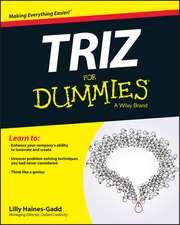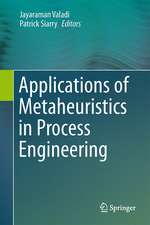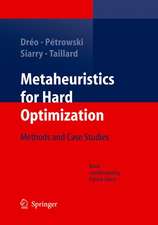Multiobjective Optimization: Principles and Case Studies: Decision Engineering
Autor Yann Collette, Patrick Siarryen Limba Engleză Paperback – 17 sep 2011
| Toate formatele și edițiile | Preț | Express |
|---|---|---|
| Paperback (1) | 454.92 lei 6-8 săpt. | |
| Springer Berlin, Heidelberg – 17 sep 2011 | 454.92 lei 6-8 săpt. | |
| Hardback (1) | 534.36 lei 6-8 săpt. | |
| Springer Berlin, Heidelberg – 8 aug 2003 | 534.36 lei 6-8 săpt. |
Din seria Decision Engineering
- 20%
 Preț: 1007.20 lei
Preț: 1007.20 lei - 18%
 Preț: 1137.55 lei
Preț: 1137.55 lei - 18%
 Preț: 896.21 lei
Preț: 896.21 lei - 23%
 Preț: 574.40 lei
Preț: 574.40 lei - 18%
 Preț: 955.40 lei
Preț: 955.40 lei - 18%
 Preț: 790.46 lei
Preț: 790.46 lei - 15%
 Preț: 641.53 lei
Preț: 641.53 lei - 15%
 Preț: 698.62 lei
Preț: 698.62 lei - 18%
 Preț: 944.19 lei
Preț: 944.19 lei - 15%
 Preț: 635.96 lei
Preț: 635.96 lei - 18%
 Preț: 895.89 lei
Preț: 895.89 lei - 15%
 Preț: 635.15 lei
Preț: 635.15 lei -
 Preț: 481.43 lei
Preț: 481.43 lei - 18%
 Preț: 943.25 lei
Preț: 943.25 lei - 18%
 Preț: 1247.26 lei
Preț: 1247.26 lei - 15%
 Preț: 639.41 lei
Preț: 639.41 lei - 20%
 Preț: 988.48 lei
Preț: 988.48 lei - 15%
 Preț: 648.89 lei
Preț: 648.89 lei - 20%
 Preț: 640.19 lei
Preț: 640.19 lei - 24%
 Preț: 809.40 lei
Preț: 809.40 lei - 18%
 Preț: 959.67 lei
Preț: 959.67 lei - 18%
 Preț: 778.13 lei
Preț: 778.13 lei - 20%
 Preț: 1161.57 lei
Preț: 1161.57 lei - 18%
 Preț: 944.06 lei
Preț: 944.06 lei - 20%
 Preț: 640.05 lei
Preț: 640.05 lei - 15%
 Preț: 656.58 lei
Preț: 656.58 lei - 18%
 Preț: 942.44 lei
Preț: 942.44 lei - 18%
 Preț: 943.88 lei
Preț: 943.88 lei - 18%
 Preț: 1227.67 lei
Preț: 1227.67 lei
Preț: 454.92 lei
Nou
Puncte Express: 682
Preț estimativ în valută:
87.06€ • 94.53$ • 73.13£
87.06€ • 94.53$ • 73.13£
Carte tipărită la comandă
Livrare economică 22 aprilie-06 mai
Preluare comenzi: 021 569.72.76
Specificații
ISBN-13: 9783642072833
ISBN-10: 3642072836
Pagini: 304
Ilustrații: IX, 293 p.
Dimensiuni: 155 x 235 x 16 mm
Greutate: 0.43 kg
Ediția:2004
Editura: Springer Berlin, Heidelberg
Colecția Springer
Seria Decision Engineering
Locul publicării:Berlin, Heidelberg, Germany
ISBN-10: 3642072836
Pagini: 304
Ilustrații: IX, 293 p.
Dimensiuni: 155 x 235 x 16 mm
Greutate: 0.43 kg
Ediția:2004
Editura: Springer Berlin, Heidelberg
Colecția Springer
Seria Decision Engineering
Locul publicării:Berlin, Heidelberg, Germany
Public țintă
GraduateCuprins
I Principles of multiobjective optimization methods.- 1 Introduction: multiobjective optimization and domination.- 2 Scalar methods.- 3 Interactive methods.- 4 Fuzzy methods.- 5 Multiobjective methods using metaheuristics.- 6 Decision aid methods.- II Evaluation of methods, and criteria for choice of method.- 7 Performance measurement.- 8 Test functions for multiobjective optimization methods.- 9 An attempt to classify multiobjective optimization methods.- III Case studies.- 10 Case study 1: qualification of scientific software.- 11 Case study 2: study of the extension of a telecommunication network.- 12 Case study 3: multicriteria decision tools to deal with bids.- 13 Conclusion.- References.
Recenzii
From the reviews:
"Multiobjective optimization allows a degree of freedom, which is lacking in mono-objective optimization. … The book is accessible to the novice and expert … and can be used by students, engineers and scientists working in aerospace, automotive, and mechanical and civil engineering." (Stefan Jendo, Zentralblatt MATH, Vol. 1103 (5), 2007)
"Multiobjective optimization allows a degree of freedom, which is lacking in mono-objective optimization. … The book is accessible to the novice and expert … and can be used by students, engineers and scientists working in aerospace, automotive, and mechanical and civil engineering." (Stefan Jendo, Zentralblatt MATH, Vol. 1103 (5), 2007)
Textul de pe ultima copertă
From whatever domain they come, engineers are faced daily with optimization problems that requires conflicting objectives to be met. This monograph systematically presents several multiobjective optimization methods accompanied by many analytical examples. Each method or definition is clarified, when possible, by an illustration. Multiobjective Optimization treats not only engineering problems, e.g in mechanics, but also problems arising in operations research and management. It explains how to choose the most suitable method to solve a given problem and uses three primary application examples: optimization of the numerical simulation of an industrial process; sizing of a telecommunication network; and decision-aid tools for the sorting of bids. This book is intended for engineering students, and those in applied mathematics, algorithmics, economics (operational research), production management, and computer scientists.
Caracteristici
Presents the principles of multiobjective or multicriteria optimization Describes ist main methods Evaluates the efficiency of different methods and considers the choice of an algorithm for a given problem The methods are illustrated by case studies from different fields of engineering Addresses students, researchers and experts in mathematics, engineering, and economics















